The European Championship in the Belgian Vilvoorde in 1973 was met with a lot of expectations. Guess what? Did the victory come? Yes. And not only that. He also gained bronze medal in combination. By that he proved that not only is he fantastic in tricks, but he is also very well skilled overall. Even the so far best European, Italian Roby Zucchi, couldn’t keep up with him. Franta’s form was clearly perfect for the World Championship. But in that moment, nobody still knew that he wouldn’t be able to show it on the World Championship.
The adversity of the times
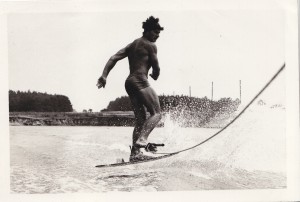
The year 1973 was marked by the intervention of the higher powers. František, even though a European Champion, couldn’t travel to the World Championship organized by Colombia, and show his amazing skills. Nobody ever said what the real cause of his absence was. Allegedly it wasn’t because of financial reasons. So why was such decision made? Even František himself doesn’t know the real reason till these days and he doesn’t want to be searching for it. Why would he be searching, when there is no means to turn back the time? This affair was very nicely described in a newspaper article called “Surprise for Stehno”. The article mentions that there were no financial obstacles for the participation in the World Championship. It is also described there how the then-chairman of the ČSTV Milan Heinik said in the live broadcast from the Czechoslovakian Championship that Stehno will go to the World Championship. Unfortunately, after a week, everything was different. At the end of the article, the newspaper editor talks very aptly about hazarding with the good name of the Czechoslovakian water skiing.
The former colleague from the national team Zdeněk Hovorka remembers the whole affair: “Concerning Bogota, I remember it very well. The trouble was that our club didn’t have money for me and Franta for the air ticket to London. From there we both had booked and paid for flight to Colombia. We had an invitation from the world federation. So we both wanted to buy our own rail ticket to England, but this wasn’t liked much. I think the trouble probably was that there was no flight ticket from London for “the accompaniment”.
The year 1974 also wasn’t very favorable, because the Championship was held in the Republic of South Africa, which was considered a “racist” country and that’s why Czechoslovakia didn’t take part in it. What could have been done? Nothing. Franta could only exercise even harder and wait for another opportunity.
Worldwide success
The worldwide success came during 1975, when the European Championship was held in Trier, in the Western Germany, and Franta was once again in a fantastic shape. He won the championship and with that he gained the third title of the European Champion. From there on, he could look forward to the World Championship in London.
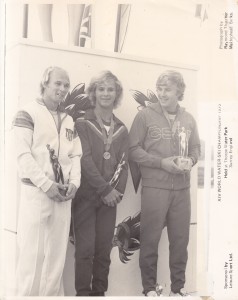
A training camp in Miami followed, and thanks to that he won the silver medal in tricks on the World Championship. The only one who beat him was the Venezuelan phenomenon Carlos Suaréz. However, our athlete acted with a great expertize. His routine consisted of unbelievable thirty six exercises. By the last toe trick he felt that he wouldn’t be able to meet the time limit, so he tactically used a lower level of difficulty. Thanks to that he was able to manage the trick and win the medal. The steadiness of our athlete is even mentioned in another newspaper article, where it is said that Franta didn’t fall for two years during his routine, and if he did, then only after the time limit. This no doubt signals the successes of the following years.
In that year, this striking world success fetched Franta the seventh place in the survey called “Athlete of the year”. The first place in this survey was won by Karel Kodejška, who became a World Champion in ski flying in the Austrian Kulm. But for example the outstanding athlete Helena Fibingerová ended up behind František.
The last European gold
In 1976, Franta ventured to Florida again, to the school of Ricky McCormick, and afterwards he dominated the European Championship for the fourth time. This Championship was held in Milan in Italy. At that moment, Franta was simply unbeatable, and headed towards the gaining of the fifth title and the preparation for the next World Championship.
Like on a swing – a “NO” for the European Championship
But František was a little bit unlucky again. Although the European Championship was so to say just around the corner, he couldn’t take part because of the political reasons again. Once again, it was because of the participation of the Republic of South Africa. The whole situation was commented in the newspaper article, in which the then chairman of the ČSTV, Antonín Mendl, expressed himself: “Our opinion is uncompromising. We will not compete with racists!” Apart from our protest, I also handed over the report about our retirement from the European Championship to the organizers. We won’t take part in the evening opening ceremonial, and we’re leaving for home in the morning. It is true that we probably lost the title of the European Champion, but that could not in the least affect the decision of the whole team. We don’t compete with racists.”
The organizers proposed that the South African team wouldn’t take part in the tricks competition, but even that didn’t help František. Not even this was agreed by the ČSSR team. And so the medal from the “seventy seventh” disappeared forever, although its gaining was very probable. In Annenheim in Austria, our biggest rival, Mike Hazelwood (GB) won. He would probably be the only real rival to our athlete. He won his title for 6300 points, which was also feasible for our sportsman. The silver medal was “snatched” by the Swede Björg for only 4800 points, which would be a picnic for František.
Nowadays Franta says about those times: “I couldn’t do anything. Even though I didn’t agree, I couldn’t do anything else than obey the officials. Unfortunately, such were the times, and if I wanted go to the competitions all around the world, I had to behave. I could have protested as many other brave ones, but that would mean to stay at home forever.”
“YES” for the World Championship
But luckily better times were ahead of Franta– the World Championship in Milan. The way to the second medal was a bit complicated, but Fortune favors the brave, and so Franta could unexpectedly fight for his chance on the World Championship. Just before the start, they got a telegram saying that the South African team was excluded from the World Championship. Vis major, you could say. The channel Ydroscala in Milan was owned by the local communist party, which threatened to stop the water. The organizers got scared and forbade the South African team to start. And so our athlete could catch the flight and land only a half an hour before the start. He caught up with the heats in trick in the last minute, and in spite of his expectations he was in the lead. In the then time interview with Petr Dufek, he confided: “The two days before the finals were really long. The expectations of winning, an enormous opportunity, which I wanted to seize, all that caused I couldn’t even sleep. I started as last and I knew that if I wouldn’t fall, I would win! Maybe because of that I skied as if I were tied up, slower than usual, fearing an error. A wave hit me in a bad way, I neglected one figure a little bit, and the referees struck it off.”
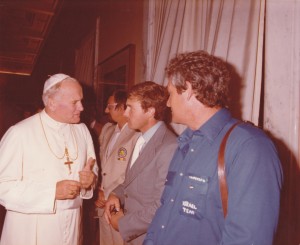
The official results were announced a long hour later. The spectators awaited the victory of either Stehno or Hazelwood. Alas. Franta was only one tenth of a second and one error away from the gold. The victory was defended successfully by Carlos Suaréz. Even though the bronze medal was a huge success, it came a little bit bitter: “I am disappointed. This may have been the opportunity of my life and I stopped a tiny little bit away from snatching the dreamed-of gold.” Although during the confusion before the World Championship he was sure he would take part in the finals, he didn’t count for the medals. In the end, he was glad that he didn’t come home without it.
The competition with the upcoming king
In 1978, the European Championship took place in the French Temple-sur-Lot again. This place held its golden memories for František, because it was here where he gained his first title. Also this time it all looked well. After the heats he was on the third place. But in the end he left without any medal.
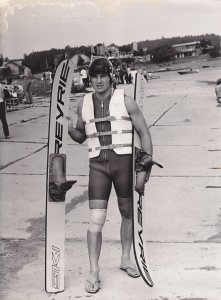
But this Championship meant the beginning of a career of a French athlete who holds Franta as his role model even to these days. The then only fourteen years old Patrice Martin won his first European Championship title there in the tricks. Another five titles in a row followed. During his career, he gained unbelievable 34 titles altogether. This achievement has no parallel. To all this, he also added 12 titles of the World Champion.
The competition was very though, and so František had to prepare thoroughly for his last season. He still wanted to achieve the medal posts once again.
Good-bye medal
On the European Championship in Rome he won the bronze medal in tricks. By that time, František Stehno was 30 years old and he lost to the incoming legend and his friend from France. The later phenomenal Patrice Martin gained his second title in a row here, and he was still only fifteen years old! In the World Championship in Toronto, František says his good-bye with the seventh place, and closes his remarkable career by these words: “It is necessary to know when to leave.”
During his career, he won eight medals altogether, but we all feel that it could have been many more. Unfortunately in those times, the “comrades” (meaning the members of the communist party) didn’t allow some athletes to represent their country from time to time.
Lots of other athletes lived through similar stories of course. For example Jarmila Kratochvílová could tell a story about how she missed the medal from the Olympics in Los Angeles in 1984.
Frantisek´s memories
Frantisek has many unforgettable experiences from his travels, that are really noteworthy, such as when he met the Spanish painter Salvador Dalí: “In 1971 the World Championship was held in the Spanish town of Bagňolas. Czechoslovak Team Captain at that time was academic sculptor Mr. Josef Nalepa. Dalí dropped by to watch the Worlds for and unscrupulous Nalepa, a friend of Spanish team, recognized Dalí at once and went to say hi. An invitation to Dalí´s residence in Cadagués followed. There was a big party with other famous people. Furthermore, Dalí metioned his affection for crayfish. Nalepa had river crayfish caught and sent to Dalí.
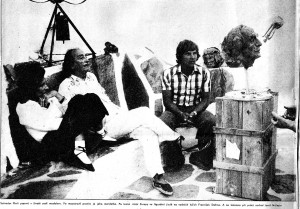
In 1974 there was yet another competition in Spain and so we paid a visit to Dalí along with Nalepa. Dalí thanked for the crayfish and asked, what would the gentleman want in return? A painting? Nalepa answered: “Mister, I would really like to portrait yourself.” The matter was quickly settled and Nalepa ran for modeling clay to the car and in 90 minutes Salvador was ready. I was holding a stand for him and saw everything. At home the head was poured off into bronze and one original was given to Dalí, who put it on display in the Figueres museum.
Not one iota less interesting is surely the meeting with pope John Paul II: “The last year of my competitive skiing the European Championship took place in Castelgandolfo close to Rome. This town was also a papal residency, at that time of John Paul II (Karol Józef Wojtyła). The lake was directly beneath his house and during the Opening Ceremony, the pope invited all Team Captains to an audience. I happened to be a Team Captain as well so I was not absent from this occasion. On Sunday after the event the pope invited all medalists to him and I had the opportunity to have a short conversation with him. He asked me where I came from and as a Polish person knew, that behind the Giant Mountains is the city of Pardubice that I hailed from.
But this is not the end of the story of this water skier from Pardubice.
Coaching
After ending his active career, František began to work as the coach of the national team. Now he had another opportunity to travel and show his qualities in this new position. In 1981 he arrives with his protégés under the slopes of Mont Blanc, to Lago d’Orta. In a local club, Sporting Borgomanero, the Czechoslovakian skiers won everything there was to win, and so the local officials immediately showed interest in engaging such a F11brilliant coach. Of course, the negotiations about such an offer weren’t easy in those times, but in the end they managed to push through a three-month probation time. The results were impeccable, and so František stayed since 1983 till 1989. And in his activities he was very successful – his protégé Patrizio Buzzotta reached the highest successes. The Italian newspapers were absolutely right to sing the praises of František’s coaching work.
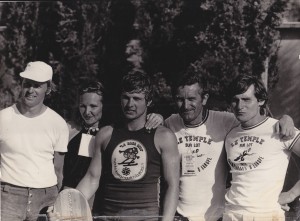
After his stay in Italy, he dedicated to his Stehno Marine Club, where his daughter Petra prepared for her career. But not only her – also other promising athletes as the sisters Čadek, Jan Danihelka, Pavel Polák or Pavla Stráníková.
In 1999 František also tried the coaching post in Greece, where he worked with a superstar Angeliki Andriopoulou, who became a World Champion in the jumps three times (2005, 2007 a 2009). In 2000-2001 he also trained the junior representation in GB. Afterwards, he worked mainly on his water-sports resort in Mělice.
Nowadays, a promising water skier Jan Slánský prepares in the Stehno Marine Club. Coached by Renata Jerglová, he managed to represent the Czech Republic on the European Dauphin Championship 2013.
Also the preparation and reconstruction works towards the European Championship 2014 are underway. This Championship will take place in Stehno Marine Club. František and his team want to show both the perfect preparation and the course and the facilities.
The wait is over
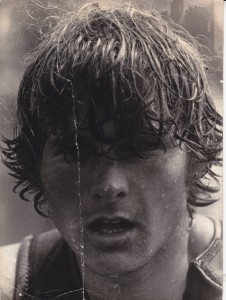
In the former regime, František gained the title “Zasloužilý mistr sportu” (meritorious master of sports). This title was granted by the regime, but Franta was entitled to it. František had to wait for a new successor for long thirty years since his last medal from European Championship in 1979. For all those long years, no-one was able to follow up his success in the elite category Open – even though in junior categories, we were always successful. Juniors were doing well on a regular basis, and we managed to win medals on the actions for the athletes younger than 21 years.
Maybe the most talented water skier was Zdena Samohýlová-Dolanská, who managed to win 12 medals altogether of all kinds, both from European and World Championships, in the junior category. Maybe it could have been her, who would follow František Stehno’s successes. Unfortunately a real sports tragedy happened – a severe injury of a knee joint. Perhaps if the orthopedic possibilities in the 80’s were the same as today, she wouldn’t have to end so early and she could have made it.
The hopes were high also for Lada Tůmová, Petra Stehnová, Klára Čadková or Martina Zlatohlávková. Among the men we have to name Jan Danihelka, Karel Sádlo or David Kubát. Among the juniors, there was really o lot of medalists.
But only first in 2009, Adam Sedlmajer won silver in combination on the World Championship. Afterwards, he added the gold in combination and bronze in slalom in the European Championship. He is the successor and the warrior of the new era.
He is not alone though. Step by step, he was joined by another golden water skier, Daniel Odvárko, who dominated the European Championship in slalom in 2013. And also the so far twice silver in combination on the European Championship (2011 and 2013), Martin Kolman.
It’s exactly these two who represent the hopes of the Czech Republic in the home-held Championship, where our team will be defending three bronze medals in a row.






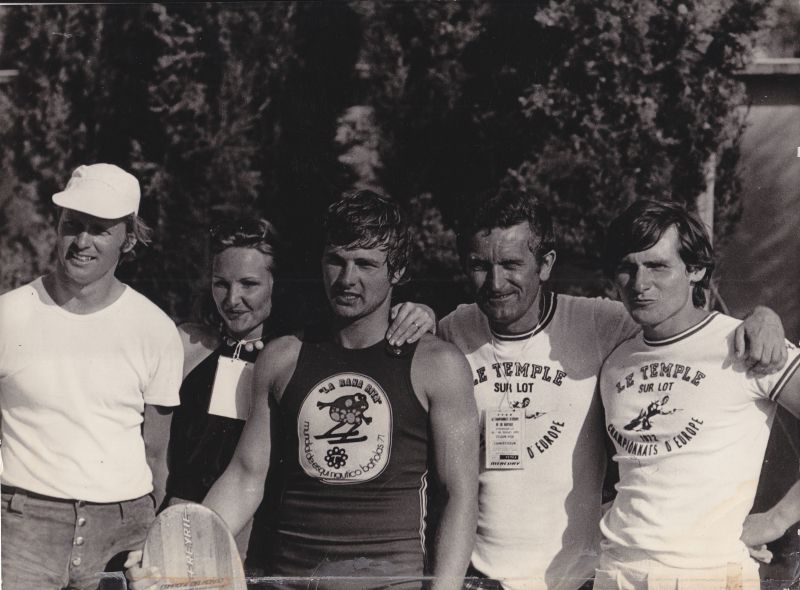
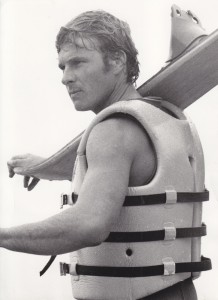 When he stopped, the big success went away with him. And for many years, darkness spread. A few bright moments appeared during those “dark” years, but none of those associated with them rose up to the top. There were simply no new successors. Only thirty years later, a warrior appeared and picked up the bits and pieces and followed up on the past. He was then inspiration for others after him. Thanks to them the bygone hero felt the urge for the success again. And so he’s back to organize an European Championship, and the medal success is very close again…
When he stopped, the big success went away with him. And for many years, darkness spread. A few bright moments appeared during those “dark” years, but none of those associated with them rose up to the top. There were simply no new successors. Only thirty years later, a warrior appeared and picked up the bits and pieces and followed up on the past. He was then inspiration for others after him. Thanks to them the bygone hero felt the urge for the success again. And so he’s back to organize an European Championship, and the medal success is very close again…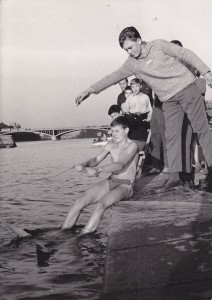 When he first started with water skiing in 1965, he was “already” 16 years old. First of all, he and his father Maxmilian obtained a tow boat, and then they went to Prague to have a look at “real skiing”. The first club was Slavia VŠCHT (Institute of Chemical Technology), which had a bit harsh beginnings. In the newspaper article of dr. J. Jeník, the chairman of the club, there is a parallel to our times: “In the beginnings, there were only a few of us, and the people around us either shook their heads in disbelief, or railed at us, or some of them even wrote official letters to the appropriate authorities – about shying the fish, destroying water banks, disturbing vacationers during their siestas and so on.” One article even mentioned the following wonderful memories of the beginnings of water skiing: “For the first competition of this year, we sent the youngest and best of us, the 17 year old Franta Stehno. He will be able to endure the shame and the rest of us will be able to assess the level of our skills.”
When he first started with water skiing in 1965, he was “already” 16 years old. First of all, he and his father Maxmilian obtained a tow boat, and then they went to Prague to have a look at “real skiing”. The first club was Slavia VŠCHT (Institute of Chemical Technology), which had a bit harsh beginnings. In the newspaper article of dr. J. Jeník, the chairman of the club, there is a parallel to our times: “In the beginnings, there were only a few of us, and the people around us either shook their heads in disbelief, or railed at us, or some of them even wrote official letters to the appropriate authorities – about shying the fish, destroying water banks, disturbing vacationers during their siestas and so on.” One article even mentioned the following wonderful memories of the beginnings of water skiing: “For the first competition of this year, we sent the youngest and best of us, the 17 year old Franta Stehno. He will be able to endure the shame and the rest of us will be able to assess the level of our skills.”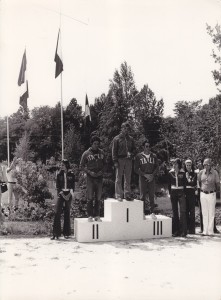 The first big success came in 1972, on the European Championship in the French Temple-sur-Lot. This meant the “golden” entry in the midst of the world water skiing elite. Franta was lucky enough that he could spend two months in a training camp in England and afterwards he won his first European Championship title in tricks. Of course it came as a big surprise. The result awoke interest and excitement. There was a nice newspaper article titled: “Golden Stehno – the same sensation as if our downhillers beat Schranz”. This article dealt mainly with the fact that our skier was able to compete, although he didn’t have many possibilities to engage in winter preparation – unlike his biggest rivals who were preparing in Florida, USA. He was also getting on well in the European competitions, and he also won the Scandinavian Championship. However, with this achievement he also set a very high standard for himself for the following years.
The first big success came in 1972, on the European Championship in the French Temple-sur-Lot. This meant the “golden” entry in the midst of the world water skiing elite. Franta was lucky enough that he could spend two months in a training camp in England and afterwards he won his first European Championship title in tricks. Of course it came as a big surprise. The result awoke interest and excitement. There was a nice newspaper article titled: “Golden Stehno – the same sensation as if our downhillers beat Schranz”. This article dealt mainly with the fact that our skier was able to compete, although he didn’t have many possibilities to engage in winter preparation – unlike his biggest rivals who were preparing in Florida, USA. He was also getting on well in the European competitions, and he also won the Scandinavian Championship. However, with this achievement he also set a very high standard for himself for the following years. The year 1973 was marked by the intervention of the higher powers. František, even though a European Champion, couldn’t travel to the World Championship organized by Colombia, and show his amazing skills. Nobody ever said what the real cause of his absence was. Allegedly it wasn’t because of financial reasons. So why was such decision made? Even František himself doesn’t know the real reason till these days and he doesn’t want to be searching for it. Why would he be searching, when there is no means to turn back the time? This affair was very nicely described in a newspaper article called “Surprise for Stehno”. The article mentions that there were no financial obstacles for the participation in the World Championship. It is also described there how the then-chairman of the ČSTV Milan Heinik said in the live broadcast from the Czechoslovakian Championship that Stehno will go to the World Championship. Unfortunately, after a week, everything was different. At the end of the article, the newspaper editor talks very aptly about hazarding with the good name of the Czechoslovakian water skiing.
The year 1973 was marked by the intervention of the higher powers. František, even though a European Champion, couldn’t travel to the World Championship organized by Colombia, and show his amazing skills. Nobody ever said what the real cause of his absence was. Allegedly it wasn’t because of financial reasons. So why was such decision made? Even František himself doesn’t know the real reason till these days and he doesn’t want to be searching for it. Why would he be searching, when there is no means to turn back the time? This affair was very nicely described in a newspaper article called “Surprise for Stehno”. The article mentions that there were no financial obstacles for the participation in the World Championship. It is also described there how the then-chairman of the ČSTV Milan Heinik said in the live broadcast from the Czechoslovakian Championship that Stehno will go to the World Championship. Unfortunately, after a week, everything was different. At the end of the article, the newspaper editor talks very aptly about hazarding with the good name of the Czechoslovakian water skiing. A training camp in Miami followed, and thanks to that he won the silver medal in tricks on the World Championship. The only one who beat him was the Venezuelan phenomenon Carlos Suaréz. However, our athlete acted with a great expertize. His routine consisted of unbelievable thirty six exercises. By the last toe trick he felt that he wouldn’t be able to meet the time limit, so he tactically used a lower level of difficulty. Thanks to that he was able to manage the trick and win the medal. The steadiness of our athlete is even mentioned in another newspaper article, where it is said that Franta didn’t fall for two years during his routine, and if he did, then only after the time limit. This no doubt signals the successes of the following years.
A training camp in Miami followed, and thanks to that he won the silver medal in tricks on the World Championship. The only one who beat him was the Venezuelan phenomenon Carlos Suaréz. However, our athlete acted with a great expertize. His routine consisted of unbelievable thirty six exercises. By the last toe trick he felt that he wouldn’t be able to meet the time limit, so he tactically used a lower level of difficulty. Thanks to that he was able to manage the trick and win the medal. The steadiness of our athlete is even mentioned in another newspaper article, where it is said that Franta didn’t fall for two years during his routine, and if he did, then only after the time limit. This no doubt signals the successes of the following years. The official results were announced a long hour later. The spectators awaited the victory of either Stehno or Hazelwood. Alas. Franta was only one tenth of a second and one error away from the gold. The victory was defended successfully by Carlos Suaréz. Even though the bronze medal was a huge success, it came a little bit bitter: “I am disappointed. This may have been the opportunity of my life and I stopped a tiny little bit away from snatching the dreamed-of gold.” Although during the confusion before the World Championship he was sure he would take part in the finals, he didn’t count for the medals. In the end, he was glad that he didn’t come home without it.
The official results were announced a long hour later. The spectators awaited the victory of either Stehno or Hazelwood. Alas. Franta was only one tenth of a second and one error away from the gold. The victory was defended successfully by Carlos Suaréz. Even though the bronze medal was a huge success, it came a little bit bitter: “I am disappointed. This may have been the opportunity of my life and I stopped a tiny little bit away from snatching the dreamed-of gold.” Although during the confusion before the World Championship he was sure he would take part in the finals, he didn’t count for the medals. In the end, he was glad that he didn’t come home without it. But this Championship meant the beginning of a career of a French athlete who holds Franta as his role model even to these days. The then only fourteen years old Patrice Martin won his first European Championship title there in the tricks. Another five titles in a row followed. During his career, he gained unbelievable 34 titles altogether. This achievement has no parallel. To all this, he also added 12 titles of the World Champion.
But this Championship meant the beginning of a career of a French athlete who holds Franta as his role model even to these days. The then only fourteen years old Patrice Martin won his first European Championship title there in the tricks. Another five titles in a row followed. During his career, he gained unbelievable 34 titles altogether. This achievement has no parallel. To all this, he also added 12 titles of the World Champion. In 1974 there was yet another competition in Spain and so we paid a visit to Dalí along with Nalepa. Dalí thanked for the crayfish and asked, what would the gentleman want in return? A painting? Nalepa answered: “Mister, I would really like to portrait yourself.” The matter was quickly settled and Nalepa ran for modeling clay to the car and in 90 minutes Salvador was ready. I was holding a stand for him and saw everything. At home the head was poured off into bronze and one original was given to Dalí, who put it on display in the Figueres museum.
In 1974 there was yet another competition in Spain and so we paid a visit to Dalí along with Nalepa. Dalí thanked for the crayfish and asked, what would the gentleman want in return? A painting? Nalepa answered: “Mister, I would really like to portrait yourself.” The matter was quickly settled and Nalepa ran for modeling clay to the car and in 90 minutes Salvador was ready. I was holding a stand for him and saw everything. At home the head was poured off into bronze and one original was given to Dalí, who put it on display in the Figueres museum. After his stay in Italy, he dedicated to his Stehno Marine Club, where his daughter Petra prepared for her career. But not only her – also other promising athletes as the sisters Čadek, Jan Danihelka, Pavel Polák or Pavla Stráníková.
After his stay in Italy, he dedicated to his Stehno Marine Club, where his daughter Petra prepared for her career. But not only her – also other promising athletes as the sisters Čadek, Jan Danihelka, Pavel Polák or Pavla Stráníková. In the former regime, František gained the title “Zasloužilý mistr sportu” (meritorious master of sports). This title was granted by the regime, but Franta was entitled to it. František had to wait for a new successor for long thirty years since his last medal from European Championship in 1979. For all those long years, no-one was able to follow up his success in the elite category Open – even though in junior categories, we were always successful. Juniors were doing well on a regular basis, and we managed to win medals on the actions for the athletes younger than 21 years.
In the former regime, František gained the title “Zasloužilý mistr sportu” (meritorious master of sports). This title was granted by the regime, but Franta was entitled to it. František had to wait for a new successor for long thirty years since his last medal from European Championship in 1979. For all those long years, no-one was able to follow up his success in the elite category Open – even though in junior categories, we were always successful. Juniors were doing well on a regular basis, and we managed to win medals on the actions for the athletes younger than 21 years.

